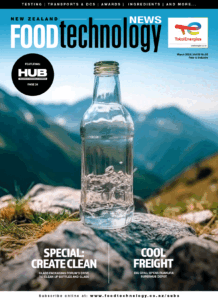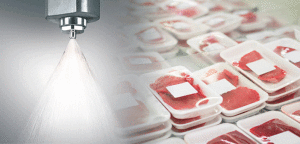Spray technology can be used in almost every industry imaginable. Using the correct spray nozzles, automated systems and spray products for your applications is crucial for your operations to run efficiently. Spraying Systems has been supplying customers with spray technology solutions for nearly 80 years, and it has become the world’s single source supplier for everything ‘spray related’.
Many of its systems utilise Precision Spray Control (PSC) to uniformly coat products and surfaces with minimal waste. PSC turns electrically-actuated spray nozzles on and off very quickly to control the flow rate. The cycling is so fast it often appears to be constant. PSC allows for the pressure of the spray nozzles to remain unaltered, resulting in no change to the coverage, spray angle and drop size. Overspray and misting is reduced – if not completely eliminated – due to the consistent pressure level of the spray nozzles.
The typical spray nozzle used in PSC systems is the high precision PulsaJet® which is made from materials approved for use in food processing plants. Using both PSC and PulsaJet spray nozzles ensures that the sprayed solution is delivered directly to the target with minimal waste. Another added benefit is the reduction or complete elimination of misting and overspray.
The AutoJet Food Safety systems use this combination and are ideal for a variety of antimicrobial and sanitising applications. The systems can be used for spraying antimicrobials in tumblers, mixers and blenders before the grinding process. Antimicrobials can be sprayed into vacuum packages for bagged whole muscle products, sliced portions and hot dogs before sealing. The systems can be integrated in the most advanced slicing systems and programmed to synchronise with blade movement when applying precise doses of antimicrobials to each sliced product before packaging. The systems can also be used to effectively sanitise conveyors and other plant equipment.
The AutoJet Food Safety Systems enhance product safety and ensure exact application and uniform coverage of antimicrobials and sanitisers. The systems have been proven to control the incidence of pathogens such as Salmonella, E-coli and listeria, making for safer food products. After implementing an AutoJet Food Safety System at their site, a prominent meat processing plant could extend the shelf-life of its meat products by 40%.
To sanitise entire rooms, the energy efficient MiniFogger® III can be installed on walls ceilings and in corners. The lightweight and compact fogging unit produces a fine mist, with drops ranging from 7.0-12 micron. A key advantage of using the MiniFogger III is the consistent misting the unit provides.
There are many applications in the meat processing industry that can be improved through the use of spray technology. One such application is spray chilling carcasses in abattoirs. The typical process of spray chilling carcasses involves circulating cold, dry air over warm carcasses. This process causes moisture to be drawn out of the carcass surface, which is then lost to evaporation resulting in shrinkage and weight loss of about 1.5% to 3.5%.
Spraying Systems has taken a different approach when designing its AutoJet® Carcass Chilling Spray System, which uses spray nozzles to spray chilled water over carcasses in order to offset the evaporative weight loss. The system will typically reduce the total carcass weight loss to within 0.5% or less. Not only does the system retain a high percentage of carcass body weight, but operators can experience savings on energy and refrigeration expenses due to the reduced heat load in chillers. To avoid excessive water consumption, each spray operation is timed and monitored. The water pressure and water temperature are regulated to achieve optimum results.
Another automated system that has been designed with reducing water use in mind is the Evisceration Table Cleaning System. The classic practice of using spray bars fitted with dozens of spray nozzles to wash and sanitise tables uses excessive amounts of water. The Spraying Systems solution reduces water use by up to 40% and achieves a more thorough and efficient clean compared to other solutions currently available in the market. The system sprays hot water via three YNRAJ rotating arms that cover the width of the trays. Attached to the arms are ceramic VeeJet® or FlatJet® spray nozzles that achieve maximum impact whilst operating with a lower flow per nozzle, thus reducing water usage.
Next to ensuring you have the highest level of food safety possible to prevent recalls, operators need to be mindful of the way processing equipment – such as conveyors, slicers and tanks – are cleaned. Spraying Systems has a wide range of handheld spray guns and tank cleaning products designed to thoroughly clean and to avoid possible product contamination risks.
For plant and equipment clean up applications, its GunJet® spray guns are ideal. The spray guns are available in high, medium and low-pressure options, and the easy-to-pull triggers allow for consistent and accurate flow control. Each gun has been ergonomically designed with handles that help the operator improve control and reduce fatigue. GunJet spray guns are the preferred manual cleaning product for many meat processing plants, as they are able to produce an effective clean in a decreased amount of time. Sanitising hard-to-reach areas such as corners and underneath equipment can be difficult. Using a hand-held, manual spray gun allows the operators to target the exact areas they need to wash down and sanitise, without spreading contaminants onto nearby equipment. GunJet spray guns are suitable for hot, cold and foam cleaning applications.
Tanks, barrels, totes, vats and vessels (as small as 1m and as large as 30m in diameter) can be cleaned using the TankJet® tank cleaning products which are designed to ensure a reliable clean whilst reducing water and chemical use. The tank cleaning range offers both portable and cleaning-in-place (CIP) automated solutions to ensure the highest quality clean possible.


































































































